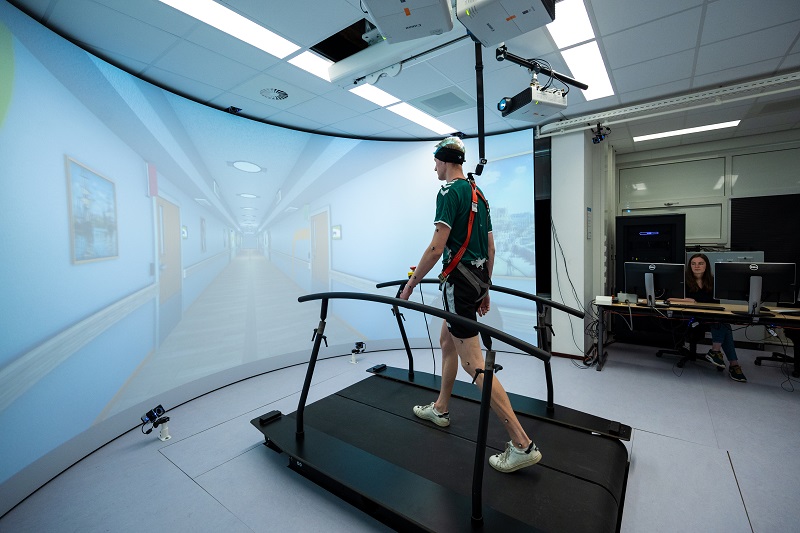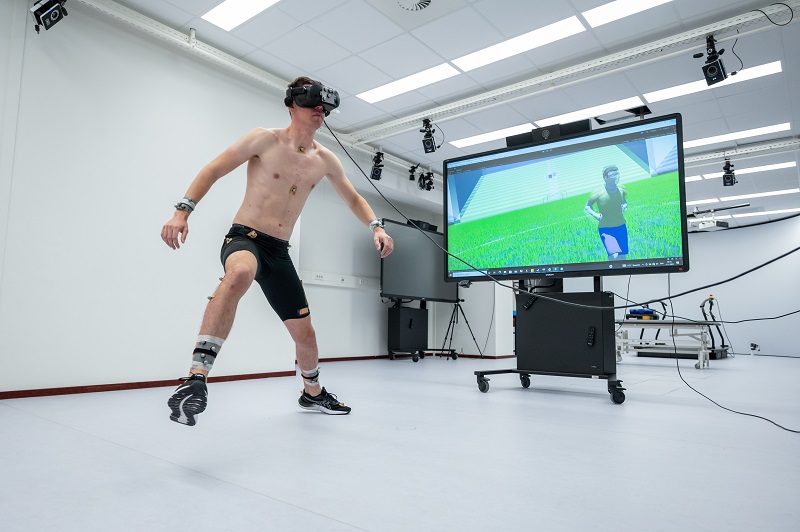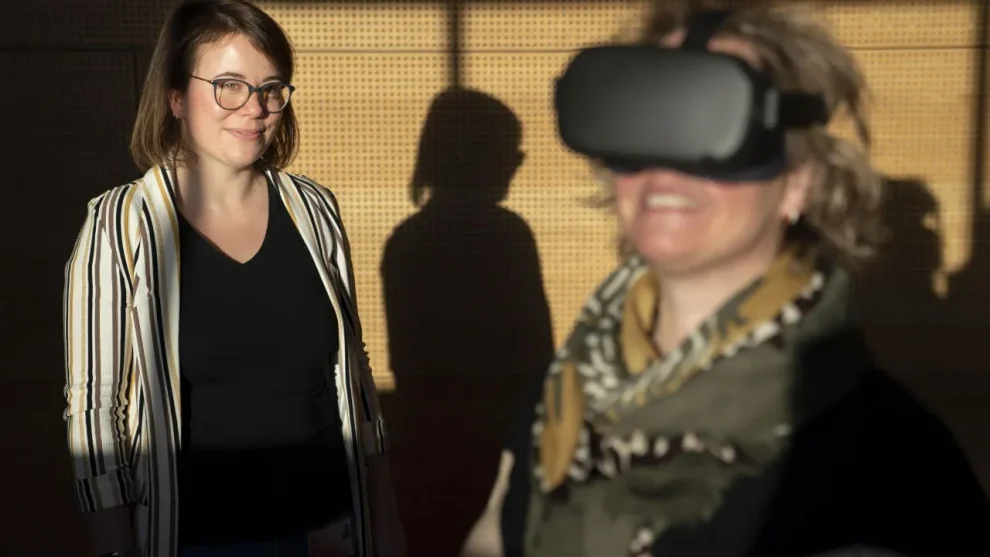Serious games for research
Serious Games as a Research Tool Games as a Method Serious games can contribute to scientific research in many different ways and at many different stages. Think of collecting quantitative…

Serious gaming has many application possibilities within the research field. In healthcare, for example, data collection on rehabilitation processes can be achieved through playing an exergame. However, there are many additional ways in which design and gaming principles can be valuable within the context of scientific research. For example, the process of game development itself can be utilized as a research tool or as an engaging form of action research. In this article, we’ll highlight some practicle examples from our portfolio.
Serious gaming is generally associated with the final product: a game with a specific goal, such as conveying knowledge, changing behavior, or gathering data for scientific research. What is less known is that the design process leading up to the game is also of great value to the research field.
The different stages of the development process, which is often co-creative and involves multiple testing moments, offer ample opportunities for collecting qualitative and quantitative data. Creating together with target groups quickly leads to valuable discussions about bottlenecks, desires, and different perspectives on the issue at hand. Whether it’s a game or another (creative) intervention – if you approach the design process in a structured, iterative, and co-creative way, it yields a wealth of new insights.
In our whitepaper ‘Psychology, Science and Gaming’ we mapped out some of the ways in which serious gaming and research influence each other, based on our ten years of experience in the serious gaming field.
In short:
Each process is different. However, all research projects we were involved in had one thing in common: the use of a serious gaming research strategy – for example, utilizing rapid prototyping to gather input from the target group – resulted in highly engaged participants. More importantly, the co-creative approach often resulted in truly new knowledge about how to translate theoretical knowledge into practical applications benefiting people and society.
Here are two examples of serious gaming in research and how it can be used, highlighting the positive impact of games in different areas: for research participants, for scientists and for professionals. Each example has a specific purpose and is adapted to the needs of research.
The Centre for Language and Speech Technology at Radboud University Nijmegen, in collaboration with 8D, conducted research into the potential of using speech technology in games designed to promote reading and speaking skills. We developed various game concepts and a working prototype called DigiJuf. At various stages, this prototype was tested with primary school children to evaluate the impact of speech technology and game elements on their speaking and reading behavior. Data collected during these playtests fueled the scientific paper “Enhancing ASR-Based Educational Applications: Peer Evaluation of Non-Native Child Speech“, which won the Best Paper Award at Trinity College Dublin in 2023.
A fully developed game is not always necessary to gather valuable data. Testing early prototypes (rapid prototyping) with intended end users usually provides raw and valuable feedback. This feedback is not only about the proposed solution but also provides deeper insights into the problem the game aims to solve. Sometimes, that is exactly the goal.
Shkorey is an educational game application designed for Eritrean youth in the Netherlands. Through playful interactions, users receive culturally sensitive information about the human body, sexuality, pregnancy, and raising young children. The app includes knowledge quizzes, references to in-depth sources, and a help map with nearby healthcare providers.
In the Shkorey app, several research questions were incorporated to help researchers from the Rutgers Expertise Center for Sexuality gain insights into the app’s usage, the target group it attracts, and the level of appreciation for the information it provides. Data collection ran from October 2023 to February 2024 and, combined with focus group interviews, resulted in a valuable research report. This report provides recommendations for further app development as well as substantive feedback and perspectives that healthcare providers and researchers can use in their work with this target group.
In addition to the integrated research component within the Shkorey app, the game’s development process deserves special mention. Even before the proposal writing stage, a core group of Eritrean youth from Leeuwarden was involved in the design of the project. Moreover, these participants played a crucial role in developing the game concept and creating its content. The co-creation process aims to achieve an effective product, but discussing concepts and desires at an early stage also generates a wealth of new knowledge. In this sense, ‘designing a game together’ is valuable as an innovative form of participatory research and driving change through the process – the Shkorey project is a prime example of this.
All design and co-creation moments during serious game development, such as feedback from end users on early playtests and visualizations, are incredibly valuable to observe. As a researcher, you gain unfiltered insights into the thoughts of end users about the problem you aim to solve together. After all, the conversation revolves around a creative design rather than the participants’ personal situations. This can reduce the emotional burden of the topic, which is sometimes much needed. Moreover, working on a game is often much more appealing to target group participants than filling out a dry questionnaire. This makes it easier to involve focus groups and informal leaders in the process.
In recent years, we have seen a growing interest in educational board and card games in the scientific field to convey research results or gather qualitative data. Serious games are often thought of as digital tools, but this is certainly not a requirement, especially when studying human behaviour is your focus. The physical and social aspects of ‘offline’ games—literally sitting around a table—provide ample opportunities to provoke human behaviors through game interactions and study them methodologically.
By now, you can probably imagine that there is no straightforward answer to that question. Designing a creative intervention offers numerous opportunities for data collection, from start to finish. The best approach depends entirely on your research goals and the type of research.
There are plenty of inspiring examples – but if we know more about your research plans, we can provide more targeted advice. Would you like to discuss this further? Don’t hesitate to contact Maarten or Johan for a (virtual) cup of coffee. It’s free and quickly provides clarity. Both have a wealth of experience with innovation projects within a research context. They are happy to share this knowledge with enthusiastic researchers and innovators.
Finally, another excellent example of serious games in research is our partner Lise Beumeler’s PhD research at the Medical Center in Leeuwarden. Watch the webinar Healthcare & Serious Gaming to learn how she integrated gaming into her research.

Maarten likes to think along!

Serious Games as a Research Tool Games as a Method Serious games can contribute to scientific research in many different ways and at many different stages. Think of collecting quantitative…

Interested in the possibilities of serious gaming in healthcare and research, and want to know more about the process of doing PhD research in this field? On July 5, 2023,…